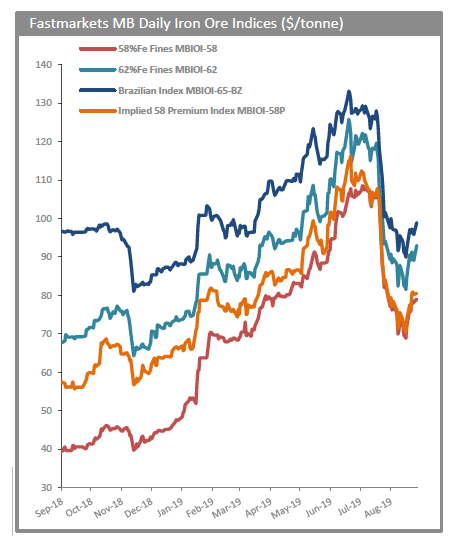Benchmark iron ore prices spiked on Monday after trade data showed Chinese imports of the steelmaking raw material remain robust despite an economic slowdown in the top commodity consumer.
The Chinese import price of 62% Fe content ore jumped by 4.4% on Monday to $92.97 per dry metric tonne according to Fastmarkets MB.
“We remain cautious about iron ore prices going into September in light of the still-uncertain trade outlook, the general malaise still plaguing large swathes of China’s industrial economy and a steadily-improving supply picture”
Edward Meir– INTL FCStone London
China’s iron ore purchases in August totalled just under 95m tonnes, up 4.2% from July and 6.2% from last year customs data showed, marking the highest level of imports since January 2018. Iron ore imports are set to reach another record in 2019, with annualized shipments running at 1.12 billion tonnes.
Inventories at Chinese ports are climbing in tandem however, rising for the eighth straight week to 126.7m tonnes.
“We remain cautious about iron ore prices going into September in light of the still-uncertain trade outlook, the general malaise still plaguing large swathes of China’s industrial economy and a steadily-improving supply picture, but we don’t see as drastic a fall as what we saw in August,” Edward Meir, commodity consultant at brokerage INTL FCStone in London, was quoted by Reuters as saying.

The rally in iron ore has been a boon for the world’s largest diversified miners providing valuable cash flow for the top 3 producers – Vale, Rio Tinto and BHP – at a time when the copper price and overall metal demand (with the notable exception of nickel) remain soft.
Iron ore peaked in July just shy of $126 a tonne, the highest since January 2014, but declined over the summer months as fears of a shortage on the seaborne market receded.
The price of iron ore is up 28% year-to-date following a dam burst at Vale’s Brumadinho operations in Brazil that killed more 300 people. In response, the world no 1 producer initially suspended 93m tonnes of output, but the Rio de Janeiro-based company has since been able to bring about a third of lost capacity back online.
